 |
meshuggenernounDefinition of meshuggener
: a foolish or crazy person
|
In Saudi Arabia, a rabbi angles to lead a Jewish community that doesn’t exist
Jacob Herzog is loudly trying to build Jewish life in a country where non-Islamic displays are forbidden, raising concerns among local Jews who prefer to stay under the radar
In late November, on the third night of the Jewish festival of Hanukkah, an ultra-Orthodox Jew from Israel lit candles in his Riyadh hotel room.
Displaying the holiday candles publicly, as Orthodox Jews traditionally do, could have landed the man in a heap of trouble. Even today, despite Saudi Arabia opening up significantly to the West, there is no open practice of Judaism in the country and proselytization of any religion but Islam is illegal and can carry harsh penalties.
So instead of displaying the candles for all to see, Jacob Yisrael Herzog drew the curtains in front of his window.
Then he posted a video of himself lighting the candles on Twitter.
For Herzog, the public-private act was just the latest move in a self-propelled campaign to become the chief rabbi of Saudi Arabia, a country that officially has no Jewish community.
Since the summer, Herzog has made five trips to Saudi Arabia in an attempt to establish a recognized Jewish presence in the kingdom. While the tangible impact of his efforts has seemingly been limited thus far, he is not shy about sharing his ambitious goals for the future, which run the gamut from drawing attention to kosher food in supermarkets via Instagram to opening Jewish community centers and a religious day school.
Herzog’s effort to make Jewish practice more accessible and carve out a space for communal Jewish life in one of the world’s most infamous bastions of religious persecution have won him plaudits from some and more than a dollop of positive media coverage, such as a Forward article that credited him with “bringing Judaism to Saudi Arabia.”
But to the small number of Jews who live in or frequently visit the deeply conservative petrostate, accustomed to flying under the radar and keeping their religious affiliation from becoming an affront to their hosts, his bombastic approach has sparked deep misgivings.
“This is not how things are done here,” four Jews who live in the Gulf and make frequent trips to Saudi Arabia said, using the same phrase almost verbatim. “He’s acting like a bull in a china shop.”
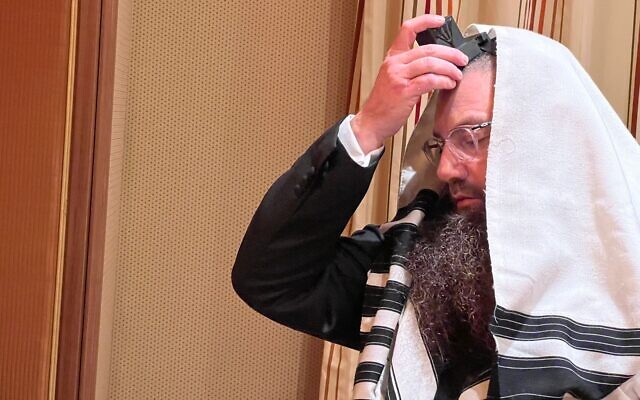
Herzog claims to be unbothered by critics who say his approach is unorthodox. Rather, he is focused on “getting stuff done.”
Fear has held other people back, and you don’t want to be held back by fear
“Fear has held other people back, and you don’t want to be held back by fear,” Herzog told The Times of Israel. “I’m not held back by fear… I’m not afraid.”
Planting the seeds
Herzog, 45, is an unlikely champion for a campaign requiring major religious policy reform in an ultra-sensitive setting. Born in the United States, he currently lives in Israel. His dual nationality allows him to visit Saudi Arabia despite Israel having no formal diplomatic ties with the kingdom. He is trained as a rabbi and ministered formally to Israeli soldiers, some of whom, he said, “still call me for advice.” But he has little Jewish communal experience beyond briefly serving as a chairman of a Chabad-Lubavitch synagogue in Jerusalem.
He has spent much more time in the business world, including stints in car tire recycling and agribusiness. Currently, Herzog owns ShneorSeed, which sells tomato and pepper seeds “to over 17 countries,” he said. And he hopes to add Saudi Arabia to that list.
“I’m very open about it. I have to make a living,” Herzog said.
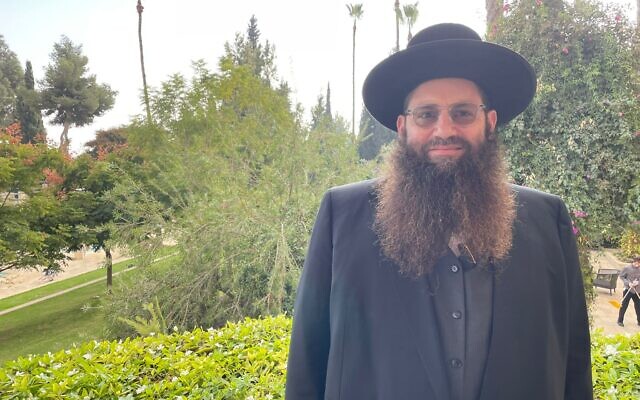
He describes himself on LinkedIn as “Rabbi and Business Entrepreneur in The Kingdom of Saudi Arabia,” specializing in “Deals and Transactions,” as well as “ritual circumcisions and interfaith dialogue.”
“There’s always things going on,” Herzog said of both his religious and business pursuits, “so I’m moving in both directions, parallel.”
Until recently, Herzog openly used his aspirational title of “Chief Rabbi of Saudi Arabia” on both LinkedIn and the website he opened for his rabbinic pursuits.
Herzog’s plan for the future, he makes clear, is for nothing less than building the country’s first modern, public Jewish community.
“The vision is [that Saudi Arabia] should have a few full communal services, everything from [Jewish] day school [and] Jewish high schools [to] synagogues, mikvaot [ritual baths] for both men and women, all the holiday services, communal holiday meals,” he said.
In addition to “offering the full range of Jewish services and a rabbi,” Herzog would like to establish Jewish community centers in the kingdom’s major expat cities.
He said his work thus far is self-funded, though he asks for donations via his website. Among other things, he is seeking money to build seven ritual baths in Saudi Arabia, each at over $1 million.
Although he and his family are part of the Chabad community, Herzog is clear that his efforts in Saudi Arabia are not linked to the organized Chabad movement. A Chabad spokesperson confirmed that the movement had not sent a representative to Saudi Arabia.
“Chabad-Lubavitch does not currently have an emissary to Saudi Arabia. The needs of Jews in Saudi Arabia are largely being met by Chabad in the UAE — from where kosher food and other needs are provided for,” said Rabbi Motti Seligson, a spokesman for the Chabad-Lubavitch movement.
Underground and out of trouble
The size of Saudi Arabia’s Jewish population is not formally known, but estimates range from the hundreds to low thousands of Jews living in the kingdom, all of whom are expatriates. There are few accounts of an indigenous community there following the advent of Islam in 632 CE, and what few Jews there were in the country fled to Israel along with Yemen’s Jews in 1949-1950.
Why draw fire? The regime won’t allow it
Today the kingdom legally forbids practicing a religion other than Islam, and there are no official synagogues or churches in the country.
“You won’t find a Jewish community here,” said Yoel Guzansky, a senior Gulf expert at the Institute for National Security Studies in Tel Aviv. “If it exists, it’s underground. Why draw fire? The regime won’t allow it.”
Similarly, an Israeli Foreign Ministry spokesman said his office had no comment on Herzog’s activities, noting that “there’s no Jewish community [in Saudi Arabia].”
Residents in the region describe a situation reminiscent of old “don’t ask, don’t tell” policies, where Jews living and working extensively in Saudi Arabia keep their religious affiliations to themselves.
Greg, a longtime Jewish resident of the Gulf who makes monthly business trips to Saudi and has Saudi-based Jewish friends, noted that Jews in Saudi Arabia are circumspect and cautious about their faith, and almost as a rule don’t advertise it. There’s no known organized community and Jews have no real way of finding each other.
Like other Gulf-based Jews quoted in this story, he requested a pseudonym for safety reasons.
“It would be very difficult to find people [who are Jewish],” Greg said. “It’s basically just word of mouth… You walk into a gym and you meet a guy called David and go, ‘hey, David, are you Jewish?’ And that’s sort of how it gets started.”
Sam, another longtime regional resident who does not live in Saudi Arabia but is involved in Gulf Jewish life, said that Jews in the kingdom aren’t looking to ruffle their hosts’ feathers.
“The Jews who live there are all there for business reasons. And they work for mainly international companies. They have to be kind of under the radar, or they at least feel they have to be,” she said.
“They’re real visitors. It’s like they’re really visitors in somebody else’s house,” she added, echoing a sentiment many Saudi-linked Jews expressed.
It is into this atmosphere that Herzog has inserted himself. While his critics are quick to note that he is well-intentioned, they fear that he is pushing the envelope of what the kingdom will tolerate and could end up hurting Jews who are quietly established there.
“I think he needs to understand the market that he’s getting into,” Greg said, comparing him to “an elephant in a china shop.”
“I think in the long term, he’ll be creating more damage to the Jewish community than anything else, because the Saudi public isn’t ready for another religion other than Islam to be publicly practiced,” Greg added.
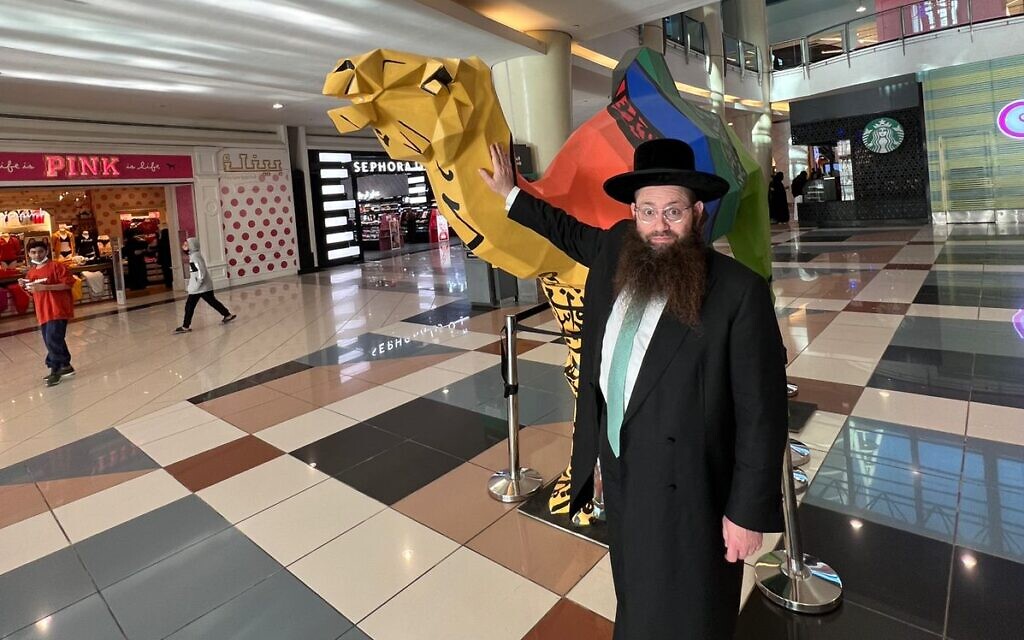
“I just don’t think the way forward is to be so in everybody’s face, knowing the Gulf people as I do now,” said Jon, a multi-decade Jewish resident of Saudi Arabia who now lives elsewhere in the region.
Sam noted that many were disturbed by a video that Herzog uploaded to social media in October of him dancing in the street with a local Saudi, as well as other posts flaunting his Jewishness.
“It scared the crap out of the Jews who are living there because they’re so under the radar about being Jewish,” she said.
Herzog offered the video as evidence that “they’re happy I’m here.”
While Herzog has had positive experiences with Saudi locals, there is not a uniformly positive attitude toward public expression of Jewishness in the Twittersphere.
Writing in Arabic, one commentator on his post warned Herzog that “someday…the stone and the trees will guide us to you,” an allusion to a Quranic verse that says that rocks and trees will expose Jews so they can be killed. This verse is also part of the Hamas charter.
I found him on Twitter and I just messaged him and he was straight back in contact, quite excited to have someone to help
Some people are excited about Herzog’s efforts, especially among travelers who said his involvement there made them feel more comfortable visiting the country.
“I was kind of Googling to see if I could find anything Jewish at all in Saudi Arabia,” said Noa Levy, 42, a London-based mortgage broker who reached out to Herzog before confirming a personal trip to Saudi Arabia. “I found him on Twitter and I just messaged him and he was straight back in contact, quite excited to have someone to help. I don’t think he has such a big demand there.”
Although they never did meet in person, Herzog helped Levy understand where she could “find kosher food in supermarkets” and he gave her the local Shabbat times.
“I think it’s quite brave,” Levy said of Herzog’s efforts.
M., a Jerusalem-based businesswoman who declined to use her name because Israeli travel to Saudi Arabia is still technically illegal, got help from Herzog on finding kosher food and electric candles she could use for Shabbat.
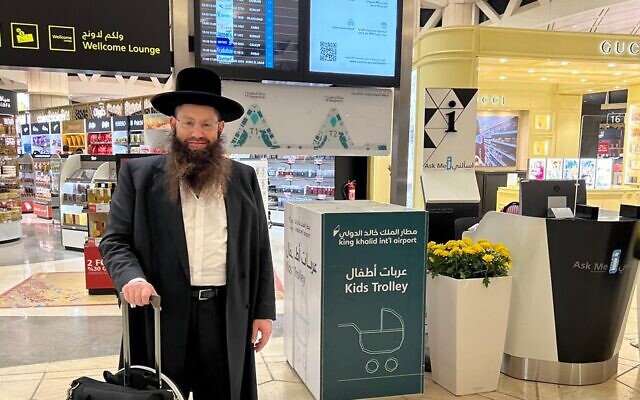
“He’s been really amazing and really helpful,” she said.
Herzog is unfazed by the criticism from “those people sitting in Dubai and Bahrain,” and argues that staying underground is not helping Jews.
“When you do something time and time and over again and it doesn’t work, then if you keep on doing the same thing, you’re not going to get anywhere,” he said.
Herzog is adamant that he respects and obeys the laws of the kingdom and only operates within the bounds of what is legally permitted. But within those bounds, he’s willing to try new methods.
“There’s no law against walking around like this in Saudi Arabia, right?” Herzog said, referring to his distinct ultra-Orthodox dress.
No tolerance… yet
To Herzog and others, Saudi Arabia may seem ripe for opening up to the Jewish community. Driven by Crown Prince Mohammed Bin Salman, the kingdom has been undergoing a liberalization process in a bid to become a major international business hub, putting on a friendlier face toward Western visitors. The country has also been cooperating secretly with Israel against Iran for years, according to reports, and many saw it next on the normalization list after the United Arab Emirates and Bahrain established ties with Israel.
The UAE has indeed seen a blossoming of public Jewish life since the Abraham Accords, but the community there operated underground for over a decade before being able to step out into the sunlight.
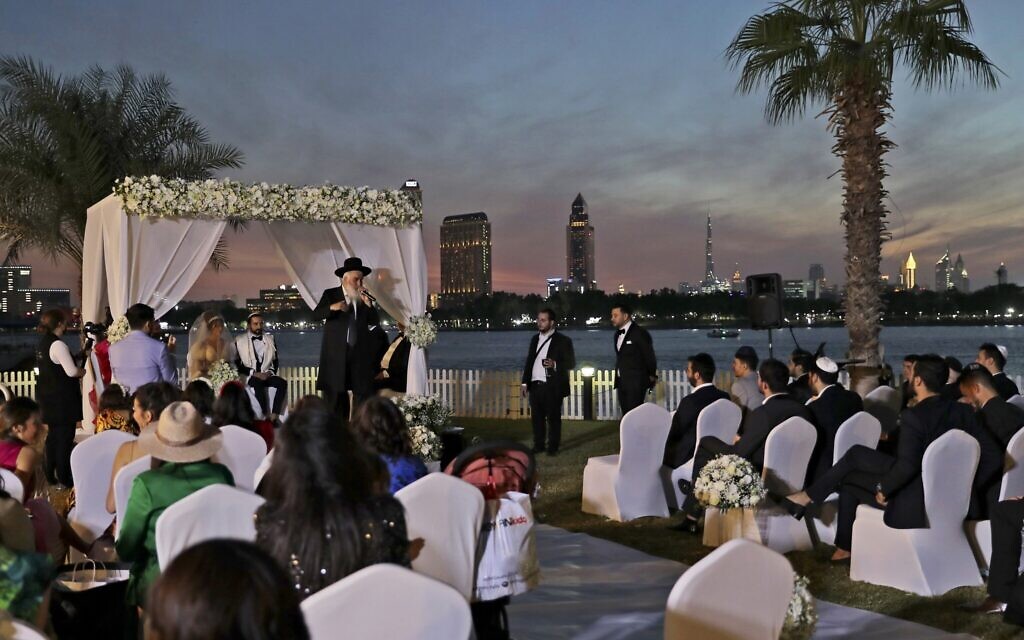
“You’d arrive in the airport in Dubai with a kippa [religious skullcap] and the Emiratis would ask you to put a baseball cap on,” said Greg, a longtime resident. “It was for your own safety.”
Today the UAE community operates in the open, has multiple communities of worship and is serviced by three publicly prominent rabbis.
You can’t go to Saudi Arabia [a handful of times] and then be like, ‘I’m going to be the head of a religion that isn’t even recognized there’
A Gulf-based source familiar with the situation said Herzog was doing the opposite of what had happened in the UAE.
“You can’t go to Saudi Arabia [a handful of times] and then be like, ‘I’m going to be the head of a religion that isn’t even recognized there,’” the source observed. “Usually the way it works is you first kind of have to do the things below ground, establish relationships with the people who live there, with the government, with the business community. And then you could do it. But he literally just announced himself as a chief rabbi and figured based off of announcing himself, that he’s going to get these people to come out of the woodwork.”
Herzog, by his own admission, has not been in contact with members of the Saudi government, although he claims that “they hear me talking.”
Guzansky noted that the advances by Dubai and Bahrain may make it easier for Riyadh to open up by giving the move “more legitimacy.”
“It’s becoming the new normal,” he said.
But he cautioned that Saudi Arabia was still a long way off from normalizing true multi-faith practice and that any reforms would be incremental at best.
“You have to understand that the religious element is very, very conservative still,” Guzansky said. “Although we see changes, the changes are not toward other religions, yet. They are more internal to Islam, allowing couples to walk hand-in-hand and sit in cinemas.”
“There’s no tolerance toward any religion in Saudi Arabia other than Islam, so far. You won’t find a synagogue. They had churches, but they were only inside American bases and they’re not there anymore. You won’t find any synagogue or church of any kind. Nothing, it’s forbidden, there’s no tolerance for that.”
The Saudi Embassy in DC did not respond to a request for comment, but The Times of Israel was able to review Herzog’s paperwork to confirm he has a tourist visa to Saudi Arabia via his American passport under his legal name, Jacob Levkoff Herzog.
A US State Department report on religious freedom states that Saudi Arabia “does not officially permit most non-Muslim clergy to enter the country for the purpose of conducting religious service.”
In a statement, the Association of Gulf Jewish Communities – a new organization representing Jewish communities from the GCC – said that it “recognizes Rabbis that have been appointed and selected to their position by the Jewish community and the governments of those countries.” While Herzog said he has been in touch with the AGJC on religious matters, he does not have a formal relationship with it.
Preparing to relocate
While Herzog has set his sights on serving as Saudi Arabia’s chief rabbi, he said he does not plan on waiting for the official title before moving there with his family full time.
“We can move there in any case,” Herzog said. “It’s more about doing what’s needed, being where people want us.”
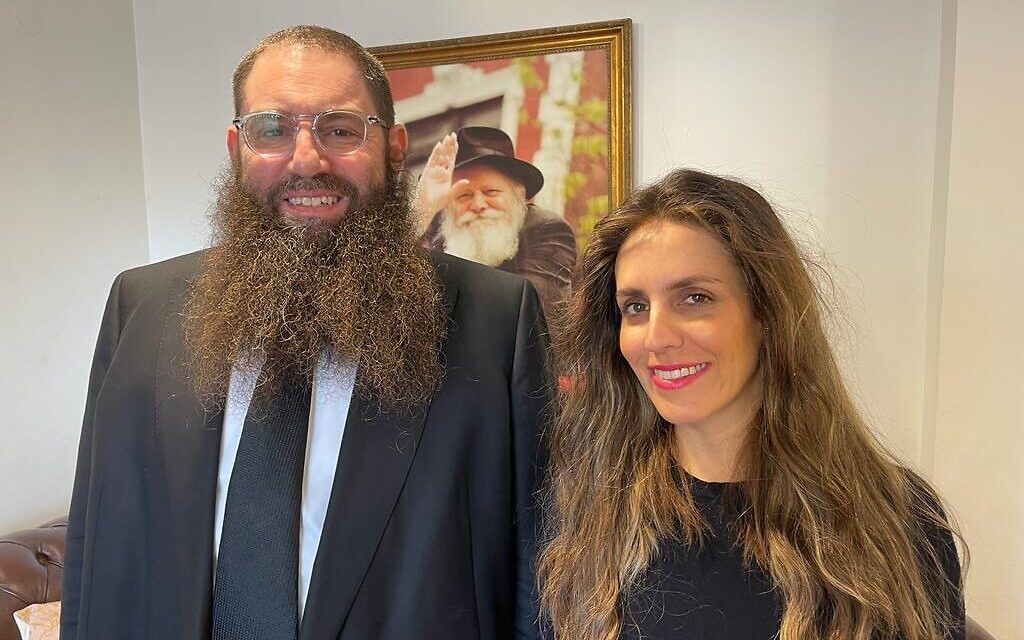
Echoing this, his wife Devorah Leah mentioned their eight children are already preparing for a potential future move.
“When my husband leaves [for a trip], the children say ‘we want to go with you,’” she said. “We are the emissaries of the [Lubavitcher] Rebbe in Saudi Arabia. [Our children] feel that already. They feel part of it.”


